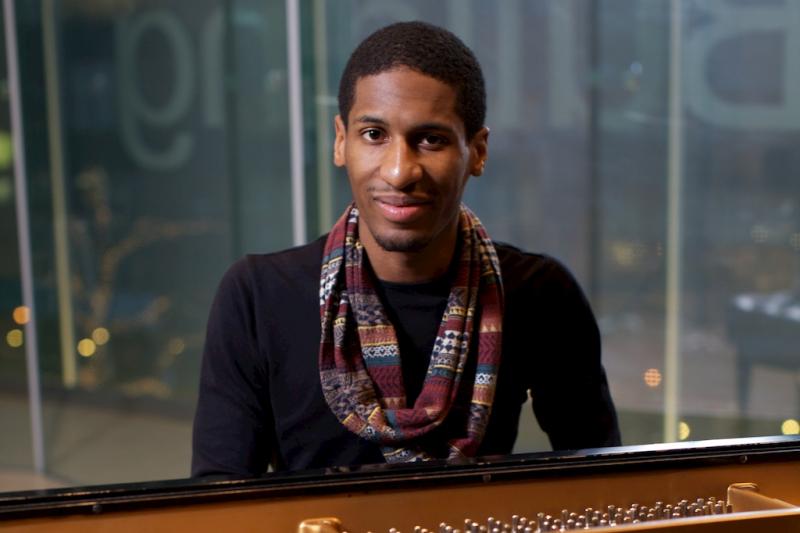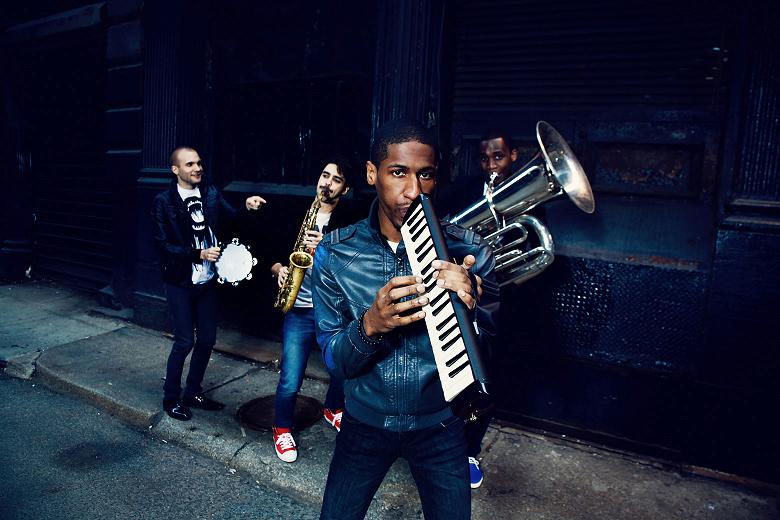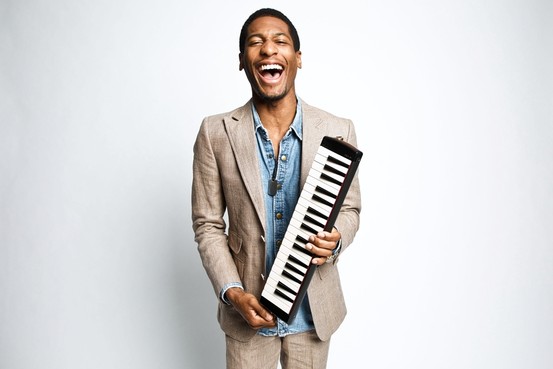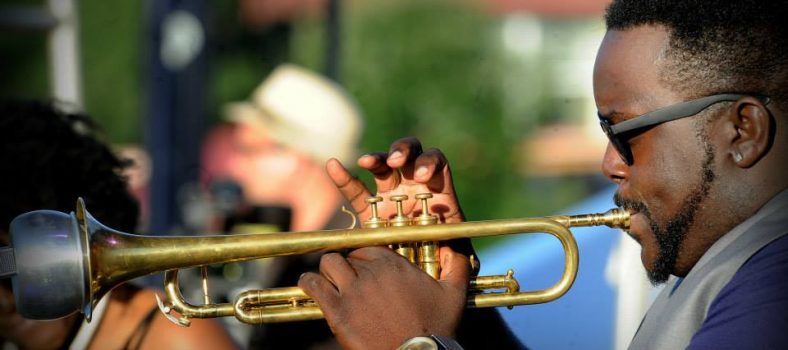
At 25 years old, Jon Batiste has already received a number of accolades including the “Movado Future Legend” award, and the “Steinway Performing Artist” award. His style balances virtuosity and openness and is gaining worldwide acclaim. His band, Stay Human, is creating a unique grassroots movement that encourages accessibility and appreciation in the art of live performance. Jon’s involvement with music education through Traveling Ambassador for Music Unites and his position as Associate Artistic Director for the National Jazz Museum, demonstrates his commitment to bringing the music to a wider audience. We were granted exlusive access to speak with Jon about the many facets of his art.
iRock Jazz: Do you think that certain jazz musicians have an advantage if they were from New Orleans as opposed to somewhere else?
Jon Batiste: I think it’s an advantage in the sense of New Orleans being one of the last places in the world that has that culture of what jazz was and what jazz is currently. All the musicians have a way of playing and approaching music. That definitely influences the way the tradition of jazz has been formed. But I do think because of that, it’s a double-edged sword. You have the sensibility that there are many things that are even further beyond it. There is such a deep tradition for jazz music that what you learn in New Orleans is only the beginning.
 iRJ: Do you think that viewing Jazz as Black Classical Music has elevated it’s standing in the eyes of the public? or would you say that viewing it as a social music would make it seem more relevant to younger generations?
iRJ: Do you think that viewing Jazz as Black Classical Music has elevated it’s standing in the eyes of the public? or would you say that viewing it as a social music would make it seem more relevant to younger generations?
JB: Jazz has always been about what’s going on with people and what’s going on with the world. In fact, Jazz can be attached to a younger generation without excluding older people. I think jazz music attached to something young is never going to hurt. I also think that the advent of the Internet and social media are factors that bring people together. Because of that, there is a lot of integration of everything; culture, integration of age, integration of tastes, and jazz music. [Jazz] is powerful because it can accommodate so many things. I think that is up to the creative genius of the artist, and also the people who are preserving the music and moving it forward in our generation. I think that’s going to come as time passes. As we figure it out and there is more collaboration and more community in the music. That is what made the music evolve in the past.
iRJ: Do you think Jazz is something you sit down and listen to in a quiet room or is it part of a festive environment?
JB: I think both are necessary, and I think both represent the people and what jazz music really stands for. I think jazz music is about freedom of expression and at its root, I think freedom of expression can be at a party. It can be dancing around on the top of a table, and having a great time. Or, it can be expressing a deep introspective sense of longing or an intellectual component of your artistry. It can be even more esoteric where you need to come to it and it doesn’t necessarily have to come to you.
iRJ: Do you find that having early success presents the challenge to keep living up to the expectations of your critics?
JB: As I mentioned when I was talking about New Orleans having a double-edged sword, I think having early success is the same. It motivates you and it makes you have a sense of inspiration to continue forward. But, it can also put you in a place where because you have an understanding of certain things, or have gotten to a certain point, you can become complacent. So, for me, I always try to maintain a level head about everything. I am doing as an artist should because that’s the best way to create great art. And the best judge for that isn’t any critic or any other musician. It’s your goals and how you define your artistry. If I am doing that and I am creating that kind of output and it’s reaching my fans and the people who are really inspired by it – which is who I do it for – then I am fine as far as critics.
 iRJ: As a young African-American musician, what has been the struggle in being recognized and getting your music to the masses?
iRJ: As a young African-American musician, what has been the struggle in being recognized and getting your music to the masses?
JB: It’s something I have never thought about in depth. Trying to look at it from a pro-active and positive angle has helped me to stay diligent about trying to get the music out there. I’m sure there are definitely challenges now that the music has grown beyond just African-American music. It can be discouraging to think about what those challenges are in the moment. I would much rather use the music as a tool to bring people together and get them to think beyond race and more about the power of the music as a tool. I also think that it brings people together, making them more social and finding things out about each other that they have in common.
iRJ: When we talk about the power of music, how have you seen the effects of this power?
JB: When I moved to New York ten years ago until now, the letters and the emails that people have sent me after shows have shown me a personal side of what happens in the audience. You can gauge, when you are on stage, that there is something in the air. It’s an energy, it’s kinetic, and people are really feeling what’s happening. They are sticking around after the show for an hour or two because the buzz in the room is so good that they don’t want to leave and that is just one way to judge it. But it’s very personal when you get that perspective from one person who was there and they tell you about it from the beginning to the end of the concert and how it affected them.
I also got letters from kids when we went into schools. The expression comes off the page in the way they talk about how they thought about the music and how they thought about life before we got there and what changed since we left. I save all these letters and it keeps me going. It keeps me wanting to go to schools when we are on the road in every city. Sometimes, you might have a 6 a.m. call to catch a flight and you played all night. But I get to the next city, look at one of these letters and it makes me want to go to the school and do this kind of outreach. Those are the types of things that show me that it’s having an effect. It’s a blessing to be able to do it and see the response.
iRJ: You are creating a new trend of getting out in the crowd and leaving the venue. Where does that come from and why did you decide to do it?
JB: Subconsciously, the influence of the New Orleans second line has some sort of influence on why I felt that was effective. Growing up and just being able to see people marching through the streets and seeing that culture and the power that it had, in a completely different context of course. New Orleans’ second line is almost like a folk tradition that has gone back years and is a great tradition. But when we do these things that we call Love Riots we kind of thought about bringing music to people no matter where we are, no matter what the location, and figuring out how to create this energy that I was talking about earlier, that kinetic energy of community and love and the experience of it all. We have done love riots in the subway, in restaurants and places where you wouldn’t ever expect to hear music. Anybody from anywhere, no matter what their background or experience, are going to come together around what’s happening because the energy of it is so positive and uplifting.
We’re not really trying to bring music to people who would go to see a concert, but also bringing music to people who we think would never come out to see the music because they don’t have the money or because they wouldn’t think to come to a live music performance or its just not on their radar for whatever reason. Bringing music to them in a way that they experience it, not only hear it and it’s something that’s palpable for them. When we go into the venue and we march around and we go out into the street it’s just a continuation of that idea and the whole philosophy of what social music is all about.
Stay Human, the name of Jon Baptiste’s band, draws on his philosophy of enhancing the transformative power of the human connection that is exemplified from a live music experience. Stay Human also represents a larger collective of people who are engaged in a movement with a shared vision of community, exchange of ideas in the arts and changing the world for the better. Look for them forming a “Love Riot” near you soon.
Words by Willow Nielsen





